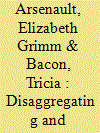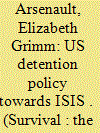| Srl | Item |
| 1 |
ID:
137159


|
|
|
|
|
| Summary/Abstract |
Terrorist organizations’ physical safe havens continue to shape the terrorist threat to the United States by extending the groups’ longevity and increasing the threat they pose. As a result, eliminating terrorist safe havens has been a key component of U.S. counterterrorism policy since at least 2001. However, some scholars challenged the post-9/11 policy consensus that terrorists find sanctuary in weak states and so-called ungoverned spaces. This article seeks to bridge this gap between scholarship and policy by offering a typology for disaggregating different kinds of terrorist safe havens. Our typology operates on two axes based on host government will (i.e., the host government's posture toward each group with haven inside its borders), as well as government capability, (specifically whether the host government possesses the specific capabilities needed to oust each group). This intersection of will and capability produces three types of havens. We briefly illustrate each type of haven using the exemplar case study of Pakistan—a location often described as an overarching safe haven, but which is actually home to several sanctuaries—and offer policy recommendations for addressing them. A need exists to disaggregate and identify how the United States can approach haven elimination. This typology and the analysis that stems from it offer a starting point for devising such strategies.
|
|
|
|
|
|
|
|
|
|
|
|
|
|
|
|
| 2 |
ID:
173758


|
|
|
|
|
| Summary/Abstract |
How did the U.S. Department of Defense (DoD) develop its torture program and, in so doing, stray so significantly from its existing standard operating procedures (SOPs) around humane prisoner treatment? This model of organizational decision-making examines both the ambiguous structural environment that interrogators faced after 9/11 and the ways in which actors used their agency to challenge the procedures and rules that had governed DoD decision-making and actions for more than six decades. By building off the work on organizational theorizing pioneered by Graham Allison and James March, this study process traces the ways in which the DoD’s institutional procedures protecting detainees were developed, challenged, and then ultimately reaffirmed. This research helps organizations ultimately understand the power—and the weaknesses—of their SOPs.
|
|
|
|
|
|
|
|
|
|
|
|
|
|
|
|
| 3 |
ID:
153371


|
|
|
|
|
| Summary/Abstract |
The United States’ resort to torture in responding to past terrorist threats raises questions about how the country will deal with captured members of the Islamic State (also known as ISIS or ISIL). As a US-led coalition seeks to retake the ISIS stronghold in northern Iraq – and after that Raqqa, the group’s Syrian headquarters – the United States has opted to delegate responsibility for detainee handling to Iraqi and Kurdish forces. US involvement against ISIS thus far has comprised an air campaign supported by special-forces troops on the ground, limiting the possibility for detainee capture. Nevertheless, the policy of delegating responsibility for any prisoners generates two key questions: what steps should the United States take to ensure the humane treatment of detainees at the hands of its allied partners, and how will the United States craft a detention policy if the fight extends beyond the current air campaign?
|
|
|
|
|
|
|
|
|
|
|
|
|
|
|
|